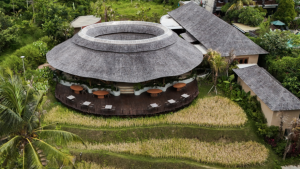Urban farming seeks to make food as local as possible. From rooftop gardens to growing pods, the gardens in cities and other urban spaces produce around 10 per cent of our global food requirements and that number is set to rise as food prices increase. Urban farms have also become an alternative to our current reliance on agriculture. As the largest driver of deforestation and a loss of diversity on the planet, commercial agriculture puts a major strain on the environment.
We look at four innovative ways to localise food production through urban farming:
Urban Farming Pod
Designed by New York-based non-profit design group Terreform ONE, the Urban Farming Pod is described as a “living” cabin for individuals and urban nuclear families to grow and provide for their daily vegetable needs. These inhabitable pods hope to plug ecology into city spaces. The sphere prototype is made of reclaimed flat packed materials. It comes fitted with a sub-irrigation system and its shaped foam panels serve as sleeves for planting and potting.
Farm tower
Paris-based French design firm ABF-lab have designed an urban farm tower that they believe could be breaking new ground in the built environment. The Food-Farm Tower is a vertical farming facility that appears to be cascading down to its community garden facilities on the ground. The tower will span over 21,000 square feet, and will take an estimated cost $3.78 million to build.
The Impact Farm
Danish innovators Mikkel Kjaer and Ronnie Markussen, of Human Habitat, have designed The Impact Farm. The farm can be transported and installed anywhere in less than 10 days. The Impact Farm is delivered in a shipping container that consists of an assembly kit of pre-made components. When the components are put together they expand to become a two-storey, vertical hydroponic (soil-free) farm, with the shipping container forming a central role in the design.
Farm in a box
Suitable for individuals and communities, the self-watering, self-feeding, weed-resistant EarthBox is a portable, reusable, maintenance-free, organic gardening system that produces 60 percent more yield than a conventional garden, using half the fertiliser and 40 per cent less water.










